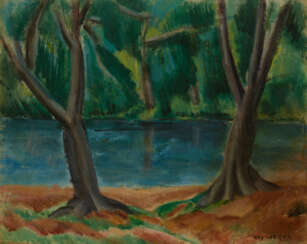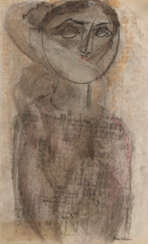макс вебер (1881 - 1961)
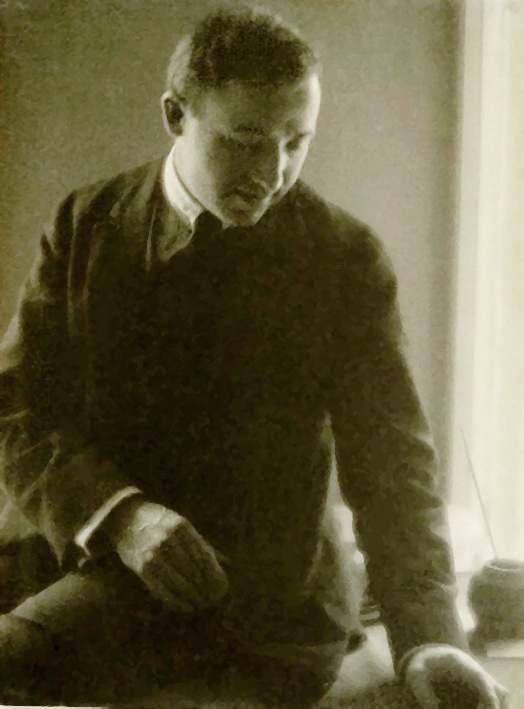
Max Weber, a Polish-born American painter, was a trailblazer in introducing Cubism to the United States. Born in 1881 in Bialystok Weber moved to New York at the age of ten. His early encounters with European avant-garde movements in Paris profoundly influenced his artistic style. Weber's work is noted for its daring adoption of Cubist techniques, which he melded with his personal expression and later, themes from his Jewish heritage.
Max Weber's notable works include "Chinese Restaurant" (1915), celebrated for capturing the dynamic essence of urban life through Cubist fragmentation. This piece, housed at the Whitney Museum of American Art, exemplifies his skill in conveying atmosphere and energy through abstract forms. Another significant work, "Sabbath" (1919), reflects his cultural background and is part of the Brooklyn Museum's collection. Weber's impact on American art is also marked by his role as an educator and his literary contributions, which include poems and essays on art that further articulated his artistic vision.
Max Weber's paintings are held in high esteem across major museums, including the Museum of Modern Art and the Smithsonian American Art Museum, highlighting his prominence in the art community. His legacy is that of a pioneer who not only introduced new styles to American audiences but also enriched it with his diverse cultural perspective.
For collectors and art and antiques experts, Max Weber's works represent a pivotal fusion of European avant-garde movements with American artistic trends, making his pieces highly significant in the study and collection of early modernist art.
For updates related to new product sales and auction events concerning Max Weber's work, sign up here to stay informed on the latest offerings.
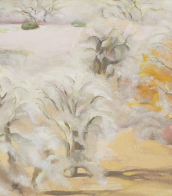

Max Weber, a Polish-born American painter, was a trailblazer in introducing Cubism to the United States. Born in 1881 in Bialystok Weber moved to New York at the age of ten. His early encounters with European avant-garde movements in Paris profoundly influenced his artistic style. Weber's work is noted for its daring adoption of Cubist techniques, which he melded with his personal expression and later, themes from his Jewish heritage.
Max Weber's notable works include "Chinese Restaurant" (1915), celebrated for capturing the dynamic essence of urban life through Cubist fragmentation. This piece, housed at the Whitney Museum of American Art, exemplifies his skill in conveying atmosphere and energy through abstract forms. Another significant work, "Sabbath" (1919), reflects his cultural background and is part of the Brooklyn Museum's collection. Weber's impact on American art is also marked by his role as an educator and his literary contributions, which include poems and essays on art that further articulated his artistic vision.
Max Weber's paintings are held in high esteem across major museums, including the Museum of Modern Art and the Smithsonian American Art Museum, highlighting his prominence in the art community. His legacy is that of a pioneer who not only introduced new styles to American audiences but also enriched it with his diverse cultural perspective.
For collectors and art and antiques experts, Max Weber's works represent a pivotal fusion of European avant-garde movements with American artistic trends, making his pieces highly significant in the study and collection of early modernist art.
For updates related to new product sales and auction events concerning Max Weber's work, sign up here to stay informed on the latest offerings.
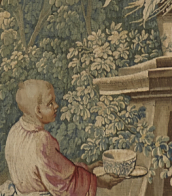

Max Weber, a Polish-born American painter, was a trailblazer in introducing Cubism to the United States. Born in 1881 in Bialystok Weber moved to New York at the age of ten. His early encounters with European avant-garde movements in Paris profoundly influenced his artistic style. Weber's work is noted for its daring adoption of Cubist techniques, which he melded with his personal expression and later, themes from his Jewish heritage.
Max Weber's notable works include "Chinese Restaurant" (1915), celebrated for capturing the dynamic essence of urban life through Cubist fragmentation. This piece, housed at the Whitney Museum of American Art, exemplifies his skill in conveying atmosphere and energy through abstract forms. Another significant work, "Sabbath" (1919), reflects his cultural background and is part of the Brooklyn Museum's collection. Weber's impact on American art is also marked by his role as an educator and his literary contributions, which include poems and essays on art that further articulated his artistic vision.
Max Weber's paintings are held in high esteem across major museums, including the Museum of Modern Art and the Smithsonian American Art Museum, highlighting his prominence in the art community. His legacy is that of a pioneer who not only introduced new styles to American audiences but also enriched it with his diverse cultural perspective.
For collectors and art and antiques experts, Max Weber's works represent a pivotal fusion of European avant-garde movements with American artistic trends, making his pieces highly significant in the study and collection of early modernist art.
For updates related to new product sales and auction events concerning Max Weber's work, sign up here to stay informed on the latest offerings.


Max Weber, a Polish-born American painter, was a trailblazer in introducing Cubism to the United States. Born in 1881 in Bialystok Weber moved to New York at the age of ten. His early encounters with European avant-garde movements in Paris profoundly influenced his artistic style. Weber's work is noted for its daring adoption of Cubist techniques, which he melded with his personal expression and later, themes from his Jewish heritage.
Max Weber's notable works include "Chinese Restaurant" (1915), celebrated for capturing the dynamic essence of urban life through Cubist fragmentation. This piece, housed at the Whitney Museum of American Art, exemplifies his skill in conveying atmosphere and energy through abstract forms. Another significant work, "Sabbath" (1919), reflects his cultural background and is part of the Brooklyn Museum's collection. Weber's impact on American art is also marked by his role as an educator and his literary contributions, which include poems and essays on art that further articulated his artistic vision.
Max Weber's paintings are held in high esteem across major museums, including the Museum of Modern Art and the Smithsonian American Art Museum, highlighting his prominence in the art community. His legacy is that of a pioneer who not only introduced new styles to American audiences but also enriched it with his diverse cultural perspective.
For collectors and art and antiques experts, Max Weber's works represent a pivotal fusion of European avant-garde movements with American artistic trends, making his pieces highly significant in the study and collection of early modernist art.
For updates related to new product sales and auction events concerning Max Weber's work, sign up here to stay informed on the latest offerings.
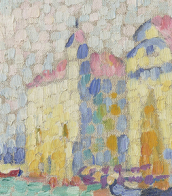

Max Weber, a Polish-born American painter, was a trailblazer in introducing Cubism to the United States. Born in 1881 in Bialystok Weber moved to New York at the age of ten. His early encounters with European avant-garde movements in Paris profoundly influenced his artistic style. Weber's work is noted for its daring adoption of Cubist techniques, which he melded with his personal expression and later, themes from his Jewish heritage.
Max Weber's notable works include "Chinese Restaurant" (1915), celebrated for capturing the dynamic essence of urban life through Cubist fragmentation. This piece, housed at the Whitney Museum of American Art, exemplifies his skill in conveying atmosphere and energy through abstract forms. Another significant work, "Sabbath" (1919), reflects his cultural background and is part of the Brooklyn Museum's collection. Weber's impact on American art is also marked by his role as an educator and his literary contributions, which include poems and essays on art that further articulated his artistic vision.
Max Weber's paintings are held in high esteem across major museums, including the Museum of Modern Art and the Smithsonian American Art Museum, highlighting his prominence in the art community. His legacy is that of a pioneer who not only introduced new styles to American audiences but also enriched it with his diverse cultural perspective.
For collectors and art and antiques experts, Max Weber's works represent a pivotal fusion of European avant-garde movements with American artistic trends, making his pieces highly significant in the study and collection of early modernist art.
For updates related to new product sales and auction events concerning Max Weber's work, sign up here to stay informed on the latest offerings.


Max Weber, a Polish-born American painter, was a trailblazer in introducing Cubism to the United States. Born in 1881 in Bialystok Weber moved to New York at the age of ten. His early encounters with European avant-garde movements in Paris profoundly influenced his artistic style. Weber's work is noted for its daring adoption of Cubist techniques, which he melded with his personal expression and later, themes from his Jewish heritage.
Max Weber's notable works include "Chinese Restaurant" (1915), celebrated for capturing the dynamic essence of urban life through Cubist fragmentation. This piece, housed at the Whitney Museum of American Art, exemplifies his skill in conveying atmosphere and energy through abstract forms. Another significant work, "Sabbath" (1919), reflects his cultural background and is part of the Brooklyn Museum's collection. Weber's impact on American art is also marked by his role as an educator and his literary contributions, which include poems and essays on art that further articulated his artistic vision.
Max Weber's paintings are held in high esteem across major museums, including the Museum of Modern Art and the Smithsonian American Art Museum, highlighting his prominence in the art community. His legacy is that of a pioneer who not only introduced new styles to American audiences but also enriched it with his diverse cultural perspective.
For collectors and art and antiques experts, Max Weber's works represent a pivotal fusion of European avant-garde movements with American artistic trends, making his pieces highly significant in the study and collection of early modernist art.
For updates related to new product sales and auction events concerning Max Weber's work, sign up here to stay informed on the latest offerings.
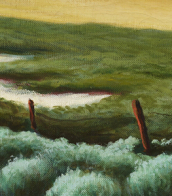

Max Weber, a Polish-born American painter, was a trailblazer in introducing Cubism to the United States. Born in 1881 in Bialystok Weber moved to New York at the age of ten. His early encounters with European avant-garde movements in Paris profoundly influenced his artistic style. Weber's work is noted for its daring adoption of Cubist techniques, which he melded with his personal expression and later, themes from his Jewish heritage.
Max Weber's notable works include "Chinese Restaurant" (1915), celebrated for capturing the dynamic essence of urban life through Cubist fragmentation. This piece, housed at the Whitney Museum of American Art, exemplifies his skill in conveying atmosphere and energy through abstract forms. Another significant work, "Sabbath" (1919), reflects his cultural background and is part of the Brooklyn Museum's collection. Weber's impact on American art is also marked by his role as an educator and his literary contributions, which include poems and essays on art that further articulated his artistic vision.
Max Weber's paintings are held in high esteem across major museums, including the Museum of Modern Art and the Smithsonian American Art Museum, highlighting his prominence in the art community. His legacy is that of a pioneer who not only introduced new styles to American audiences but also enriched it with his diverse cultural perspective.
For collectors and art and antiques experts, Max Weber's works represent a pivotal fusion of European avant-garde movements with American artistic trends, making his pieces highly significant in the study and collection of early modernist art.
For updates related to new product sales and auction events concerning Max Weber's work, sign up here to stay informed on the latest offerings.











